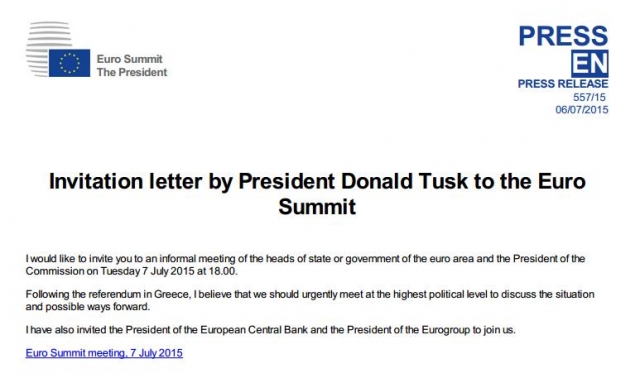Photo: kathimerini.gr
Two days after the controversial referendum in which the government-backed response NO won the majority of votes, the relations between Athens and its creditors are more than strained.
In today's speech to MEPs, European Commission President Jean-Claude Juncker sharply criticized the Greek government for its decision to leave the negotiating table and to convene a referendum in which the Greek citizens had to state whether they agreed or disagreed with the terms of an already invalid agreement proposal.
Juncker stressed that he would continue to oppose all those who insist on withdrawing Greece from the euro zone, attacking at the same time the Greek cabinet for its rhetoric. "Rhetorical declarations should stop immediately. I do not allow the Greek government to define the EU institutions and bodies as ‘terrorists’," he said.
Then Juncker added that the Greek government should submit its agreement proposals at today's EU summit and that they should provide a solution to the problem of the excessive debt. "The ball is in the field of Greece," said the European Commission President.
11 days after his sudden decision to terminate the negotiations, today Greek Prime Minister Alexis Tsipras will be in Brussels again to achieve what his government failed to do over the course of five months, namely to strike a deal with the creditors.
Athens will present its proposals first through new Minister of Finance Efklidis Tsakalotos at the Eurogroup meeting at 02:00 pm and then through Prime Minister Alexis Tsipras at the EU summit at 07:00 pm today.
According to sources, the proposals are not "fresh". They are based on the latest proposal that Jean-Claude Juncker made to Greece and have been slightly improved. The creditors, however, indicate that the situation in Greece has dramatically deteriorated over the past 11 days and the conditions under which the proposal in question was prepared are no longer valid.
Meanwhile, Alexis Tsipras had spoken by phone with Director of the International Monetary Fund Christine Lagarde and European Central Bank President Mario Draghi while preparing for the summit.
Sources claim that Lagarde had said the International Monetary Fund could only provide advice to Greece if needed. A publication in Bloomberg agency states that she had explained to the Greek Prime Minister that the International Monetary Fund could not provide financial assistance, as Greece had defaulted on its obligation to it on 30 June.
In his call to European Central Bank President Mario Draghi, Alexis Tsipras had discussed the state of liquidity of the Greek banking system. A government source from Athens told Reuters that Tsipras had defined the removal of capital controls as a "matter of urgency".
On 20 July, Greece will have to pay the European Central Bank the amount of 3.5 billion euro to cover the maturities of the Greek government bonds held by it. If this amount is not paid, the situation become even more complicated because the funding of Greek banks from the Emergency Liquidity Assistance depends on the European Central Bank.
It is noteworthy that President of Eurogroup Jeroen Dijsselbloem and European Central Bank President Mario Draghi will attend the meeting of euro zone heads of states tonight at the invitation of European Council President Donald Tusk.
